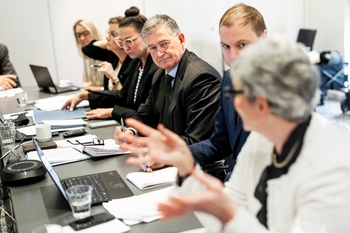Difficult questions on the Freedom of Movement Council’s agenda in 2023

Siv Friðleifsdóttir, ordförande för Gränshinderrådet 2023.
The Freedom of Movement Council was chaired by Siv Friðleifsdóttir in 2023.
The specific obstacles that have been resolved include group contributions across borders, taxation of employees who have been assigned tasks by staffing agencies in another country, and the use of Danish company cars in Sweden. One of the six obstacles has been written off as unresolvable.
Siv Friðleifsdóttir, chair of the Freedom of Movement Council in 2023, notes that the council has delivered in accordance with its goals. However, she points out that the co-operation of all parties is required for the obstacles to freedom of movement to be resolved, and that the major challenges for an integrated Nordic Region remain unresolved.
The Freedom of Movement Council pushes for the resolution of obstacles to freedom of movement, but the council itself can’t solve any obstacles – it’s up to the decision-makers and authorities of the individual countries to do so.
“I can confirm that we – and our Nordic governments – have delivered on our mandate. We’ve worked hard so that six obstacles to freedom of movement have been resolved in the course of the year. But nobody is strong on their own. We can deliver results only if the countries have a clear focus on Nordic issues and there is a political will to solve the problems,” says Friðleifsdóttir.
Five major thematic areas
Alongside the specific obstacles to freedom of movement, the Freedom of Movement Council worked on five major thematic areas in 2023. They are all linked to larger challenges for mobility and integration, and concern digitalisation issues, the recognition of professional qualifications, cross-border regional statistics, co-operation on population registration, and tax-related obstacles to freedom of movement.
In the area of taxation, for example, the Freedom of Movement Council initiated a report in 2023. The conclusion of the report was that the Nordic tax agreement and other tax regulations need to be simplified if we want to improve freedom of movement between our countries, for the sake of individuals, businesses, and commerce.
Tax issues will continue to be a high priority in the work of the Freedom of Movement Council throughout 2024.
Preventing obstacles to freedom of movement
The Freedom of Movement Council works not only to resolve existing obstacles to freedom of movement between the Nordic countries but also on preventing the emergence of new ones. Much of this work is carried out through, and in collaboration with, Info Norden and the cross-border regional information services that assist Nordic citizens and businesses on a day-to-day basis with the questions and challenges they encounter when working across borders.
Furthermore, the Freedom of Movement Council plays a role in drawing the attention of governments to freedom of movement issues that arise in times of crisis. To that end, in 2023 the Freedom of Movement Council submitted a response to the Swedish government’s legislative proposal on temporary ID checks at the borders to highlight the lack of a cross-border regional impact assessment.
Facts:
The Freedom of Movement Council is an independent body tasked by the Nordic governments with promoting freedom of movement in the Nordic Region for the benefit of both individuals and businesses.
The main task of the Freedom of Movement Council is to act as a driving force in respect of national political and administrative systems with the aim of creating the conditions for an integrated region where residents can easily work, move, study, and start businesses across borders.
This work is crucial for us to achieve the Nordic prime ministers’ Vision 2030 – for the Nordic Region is to be the most integrated and sustainable region in the world by 2030.



